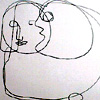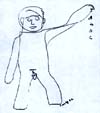|
|
James Purdy's literary career, begun in the mid-fifties, is oddly marked by success that somehow never altered his position as an outsider. His novels and stories have been translated into more than 30 languages, anthologized in text books, and have won him the Guggenheim Fellowship, an award from the National Institute of Arts on Letters and the Ford Foundation grant. The New York Arts Journal recently referred to his work as "ground breaking...revolutionary." Gore Vidal in Italy wrote that Purdy was an "authentic American genius." And Dame Edith Sitwell, who helped launch his career called him "the greatest writer produced in America during the past 100 years."
Yet in an American culture increasingly given to conservatism, Purdy found himself like a prophet in his own land, largely ignored. In his senior years he abided in the one room apartment in Brooklyn where he had lived over 30 years writing 14 novels there, 3 volumes of poetry, plays and short stories. With most of his work out of print he depended largely on donations from friends.
Like his poetry his drawings illuminate a still deeper aspect of his talent. They are spirit drawings, intensely original, archetypal, like cave drawings coming out of the deep recesses of the psyche. Purdy spiraled his pencil in free flowing lines forming innocent looking minimal human figures. Purdy stated "I don't know how to draw I just let the pencil go." Purdy was the recipient of the Morton Dauwen Zabel Fiction Award from the American Academy of Arts and Letters (1993) and was nominated for the 1985 PEN/Faulkner Award for his novel On Glory's Course (1984). In addition, he won two Guggenheim Fellowships (1958 and 1962), and grants from the Ford Foundation (1961), and Rockefeller Foundation. He worked as an interpreter and lectured in Europe with the United States Information Agency. James Purdy died in 2009.








